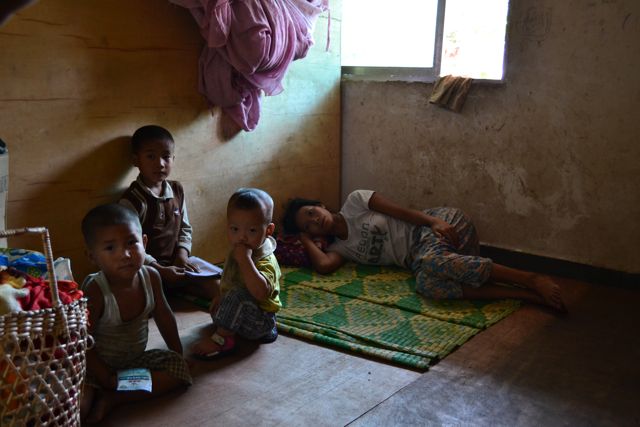The Burmese army launched a series of mortar attacks against the Kachin rebel headquarters in Laiza on Sunday, prompting panic and fear among the 15,000 displaced people living in camps nearby, according to local sources.
DVB understands that four mortar shells fell in the heart of Laiza early on Sunday morning, and another three landed in the backyards of local houses in the afternoon. No casualties or serious damage was reported, but local sources say the government is gearing up for a fresh assault on the town.
“It is clear that [Burmese troops] are closing in and their target is Laiza,” La Rip from the local humanitarian group, Relief Action Network for IDPs and Refugees (RANIR) told DVB on Monday. “We are still hearing the gunshots, the mortar shelling – it is hitting about 4-5 miles away from Laiza.”
The Burmese government has denied allegations of carrying out an attack on Laiza and says that it is acting in self-defence. After making conflicting statements last week, the army eventually admitted to carrying out airstrikes against the rebels, but insisted it was only to secure an important supply route.
But rebels say the army continues to advance on the base, which serves as headquarters to the Kachin Independence Army (KIA), after seizing the disputed outpost.
“Now they’ve put an artillery gun up there,” Min Htay, a rebel soldier with the All Burma Students’ Democratic Front (ABSDF) fighting alongside the Kachin, told DVB. “Meanwhile, there are more units coming up from Tonhoneyang to deliver ammunition [to the outpost] and we are trying to block them off, resulting in fire fights and they’ve been shelling a lot.”
According to Min Htay, over 70 rounds were fired on Monday morning alone. It follows several weeks of heavy bombing by the Burmese army, including mortar fire and air strikes targeting areas near the rebel base, which is squeezed against the Chinese border in northeastern Burma. Although the airstrikes have died down in the past few days, La Rip says that locals are terrified.
“They are very frightened and they don’t know where to go – except China and we don’t see any welcoming sign from them. People are even making the crossing without any assurances from them, because the gunshots are very close to the IDP camps.”
Some refugees have already made the uncertain trip across the border, less than six months after the Chinese government forcibly deported thousands of Kachins back into their war-torn homeland. Local sources say that China has stepped up its border security after the Burmese army launched three bombs into their territory last week. The KIA has also accused the regime of using Chinese airspace to target attacks.
“What we see is that the mortar shelling and the fighter jets and bombing are not targeting military targets – it is indiscriminate action,” said La Rip.
Meanwhile, aid workers say that the humanitarian situation in Laiza is dire, and food shortages are growing acute. Both the Chinese and Burmese governments continue to block international aid from reaching the displaced, leaving local NGOs and church groups severely overstretched. According to new research by RANIR, more than one in four children under the age of five are suffering from malnutrition.
“There is no agency providing food assistance at the moment,” said La Rip, adding that IDPs are living on 400 grams of plain rice per day. “Immediate assistance has to be extended to the IDPs at this moment.”
The KIA has been locked in a bloody battle with government troops since a 17-year ceasefire broke down in June 2011. Over 75,000 civilians have been displaced and numerous attempts at peace-talks have failed.
The ongoing conflict severely dents the reformist credentials of President Thein Sein, who has successfully brokered ceasefire deals with ten out of eleven major armed groups in Burma. The KIA, which is fighting for greater autonomy and ethnic rights, insists they want a genuine political solution.
Additional reporting by Ko Htwe



